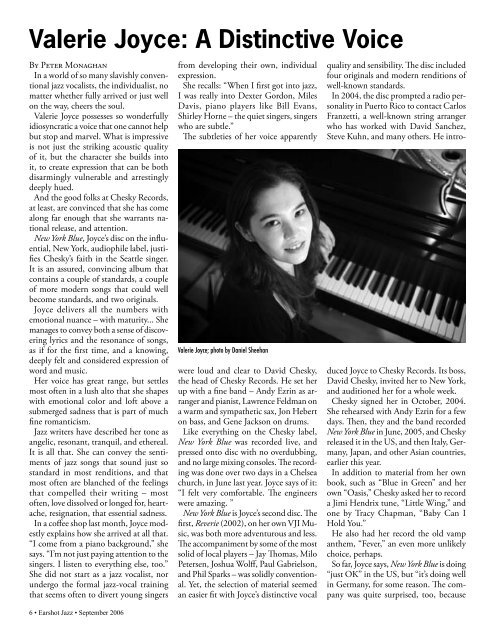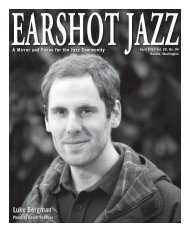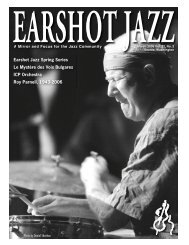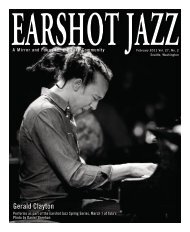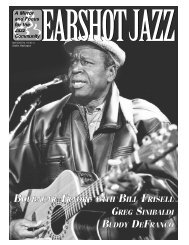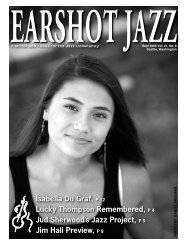Valerie Joyce Pony Boy's Day Out Festival Preview ... - Earshot Jazz
Valerie Joyce Pony Boy's Day Out Festival Preview ... - Earshot Jazz
Valerie Joyce Pony Boy's Day Out Festival Preview ... - Earshot Jazz
You also want an ePaper? Increase the reach of your titles
YUMPU automatically turns print PDFs into web optimized ePapers that Google loves.
<strong>Valerie</strong> <strong>Joyce</strong>: A Distinctive Voice<br />
BY PETER MONAGHAN<br />
In a world of so many slavishly conventional<br />
jazz vocalists, the individualist, no<br />
matter whether fully arrived or just well<br />
on the way, cheers the soul.<br />
<strong>Valerie</strong> <strong>Joyce</strong> possesses so wonderfully<br />
idiosyncratic a voice that one cannot help<br />
but stop and marvel. What is impressive<br />
is not just the striking acoustic quality<br />
of it, but the character she builds into<br />
it, to create expression that can be both<br />
disarmingly vulnerable and arrestingly<br />
deeply hued.<br />
And the good folks at Chesky Records,<br />
at least, are convinced that she has come<br />
along far enough that she warrants national<br />
release, and attention.<br />
New York Blue, <strong>Joyce</strong>’s disc on the influential,<br />
New York, audiophile label, justifies<br />
Chesky’s faith in the Seattle singer.<br />
It is an assured, convincing album that<br />
contains a couple of standards, a couple<br />
of more modern songs that could well<br />
become standards, and two originals.<br />
<strong>Joyce</strong> delivers all the numbers with<br />
emotional nuance – with maturity... She<br />
manages to convey both a sense of discovering<br />
lyrics and the resonance of songs,<br />
as if for the first time, and a knowing,<br />
deeply felt and considered expression of<br />
word and music.<br />
Her voice has great range, but settles<br />
most often in a lush alto that she shapes<br />
with emotional color and loft above a<br />
submerged sadness that is part of much<br />
fine romanticism.<br />
<strong>Jazz</strong> writers have described her tone as<br />
angelic, resonant, tranquil, and ethereal.<br />
It is all that. She can convey the sentiments<br />
of jazz songs that sound just so<br />
standard in most renditions, and that<br />
most often are blanched of the feelings<br />
that compelled their writing – most<br />
often, love dissolved or longed for, heartache,<br />
resignation, that essential sadness.<br />
In a coffee shop last month, <strong>Joyce</strong> modestly<br />
explains how she arrived at all that.<br />
“I come from a piano background,” she<br />
says. “I’m not just paying attention to the<br />
singers. I listen to everything else, too.”<br />
She did not start as a jazz vocalist, nor<br />
undergo the formal jazz-vocal training<br />
that seems often to divert young singers<br />
6 • <strong>Earshot</strong> <strong>Jazz</strong> • September 2006<br />
from developing their own, individual<br />
expression.<br />
She recalls: “When I first got into jazz,<br />
I was really into Dexter Gordon, Miles<br />
Davis, piano players like Bill Evans,<br />
Shirley Horne – the quiet singers, singers<br />
who are subtle.”<br />
The subtleties of her voice apparently<br />
<strong>Valerie</strong> <strong>Joyce</strong>; photo by Daniel Sheehan<br />
were loud and clear to David Chesky,<br />
the head of Chesky Records. He set her<br />
up with a fine band – Andy Ezrin as arranger<br />
and pianist, Lawrence Feldman on<br />
a warm and sympathetic sax, Jon Hebert<br />
on bass, and Gene Jackson on drums.<br />
Like everything on the Chesky label,<br />
New York Blue was recorded live, and<br />
pressed onto disc with no overdubbing,<br />
and no large mixing consoles. The recording<br />
was done over two days in a Chelsea<br />
church, in June last year. <strong>Joyce</strong> says of it:<br />
“I felt very comfortable. The engineers<br />
were amazing. ”<br />
New York Blue is <strong>Joyce</strong>’s second disc. The<br />
first, Reverie (2002), on her own VJI Music,<br />
was both more adventurous and less.<br />
The accompaniment by some of the most<br />
solid of local players – Jay Thomas, Milo<br />
Petersen, Joshua Wolff, Paul Gabrielson,<br />
and Phil Sparks – was solidly conventional.<br />
Yet, the selection of material seemed<br />
an easier fit with <strong>Joyce</strong>’s distinctive vocal<br />
quality and sensibility. The disc included<br />
four originals and modern renditions of<br />
well-known standards.<br />
In 2004, the disc prompted a radio personality<br />
in Puerto Rico to contact Carlos<br />
Franzetti, a well-known string arranger<br />
who has worked with David Sanchez,<br />
Steve Kuhn, and many others. He intro-<br />
duced <strong>Joyce</strong> to Chesky Records. Its boss,<br />
David Chesky, invited her to New York,<br />
and auditioned her for a whole week.<br />
Chesky signed her in October, 2004.<br />
She rehearsed with Andy Ezrin for a few<br />
days. Then, they and the band recorded<br />
New York Blue in June, 2005, and Chesky<br />
released it in the US, and then Italy, Germany,<br />
Japan, and other Asian countries,<br />
earlier this year.<br />
In addition to material from her own<br />
book, such as “Blue in Green” and her<br />
own “Oasis,” Chesky asked her to record<br />
a Jimi Hendrix tune, “Little Wing,” and<br />
one by Tracy Chapman, “Baby Can I<br />
Hold You.”<br />
He also had her record the old vamp<br />
anthem, “Fever,” an even more unlikely<br />
choice, perhaps.<br />
So far, <strong>Joyce</strong> says, New York Blue is doing<br />
“just OK” in the US, but “it’s doing well<br />
in Germany, for some reason. The company<br />
was quite surprised, too, because


